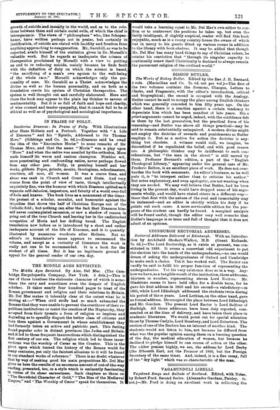BISHOP BUTLER.
The Works of Bishop Butler. Edited by the Rev. J. H. Bernard. 2 vols. (Macmillan and Co. 7s. 6d. net per vol.)—The first of the two volumes contains the Sermons, Charges, Letters to Clarke, and Fragments, with the 'editor's introduction, critical and biographical ; the second is occupied with the Analogy. Butler cannot be said to occupy the place among English thinkers which was generally conceded to him fifty years ago. On the other hand, there is a reaction against a certain tendency to depreciate him which has been manifest of late years. His a priori arguments cannot be urged, indeed, with the confidence felt in them by the last generation, but the practical force of his reasoning—and Butler was above all things practical—may be said to remain substantially unimpaired. A modern divine might not employ the doctrine of rewards and punishments as Butler employs it. But as a motive for action the doctrine is any- thing but obsolete. A witness would still, we imagine, be discredited if he repudiated the belief, and with good reason too. A philosophic thinker may be indifferent to such con- siderations, but "the man in the street" is still moved by them. Professor Bernard's edition, a part of the " English Theological Library," appearing under the general care of Mr. Frederic Belton, is an excellent piece of work. He does not over- burden the book with comments. An editor's business, as he well puts it, is "to interpret rather than to criticise his author." But notes explanatory, and even apologetic, are not wanting when they are needed. We may well believe that Butler, had he been living in the present day, would have dropped some of his argu- ments wholly, and would have stated others in a different way— those that deal with the nature of the soul and immortality may be instanced—and an editor is strictly within his duty if he points out such cases. A more serviceable edition for the pur- poses of the student can hardly be found. A marginal analysis will be found useful, though the editor very well remarks that Butler's language is so terse and full of thought that it does not admit of an epitome.


















































 Previous page
Previous page